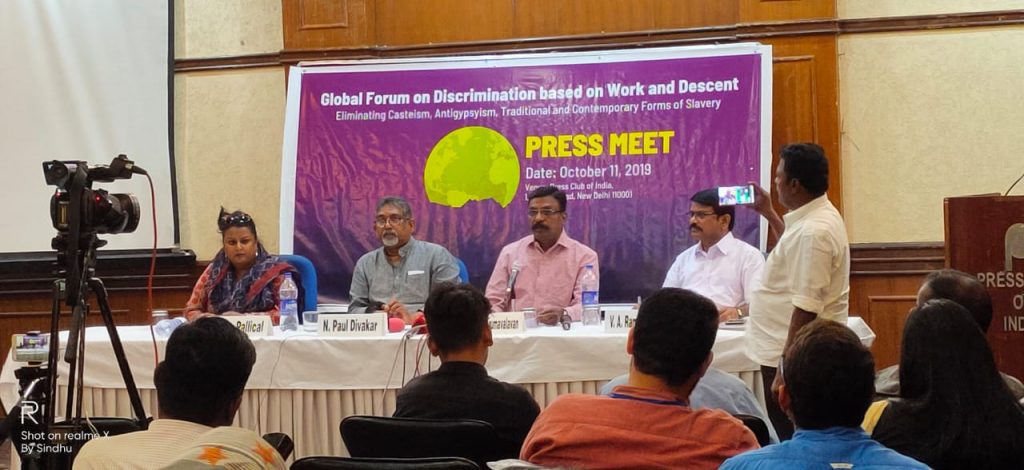Global activists demand a UN Declaration on elmination of Discrimination based on Work and Descent

By TCN News
The first Global Forum on Discrimination based on Work and Descent (DWD) was convened on 20-23 September in New York, which took place concurrently with the UN General Assembly. A total of 114 delegates from 21 countries, activists, academics, community leaders, parliamentarians and international Human Rights organisations gave a call demanding a UN Declaration on Elimination of Discrimination based on Work and Descent.
When the major global leaders at the SDG Summit were reaffirming their commitment to the ‘Leave no one behind’ agenda of development, the movement leaders from communities discriminated based on work and descent (DWD), parliamentarians, activists and leaders against Casteism, traditional and contemporary forms of Slavery and Antigypsyism, gave a Global Declaration addressing the United Nations and member states, and other international agencies, calling on them to eliminate Discrimination based on work and descent.

Years back, UN put forth the term of DWD present in Asia alongside Africa, Europe and Latin America. Over 260 million people worldwide affected by discrimination based on work and descent, constitute 3.45 percent of the global population. They suffer intergenerational and indelible stigmatization in the social and psychological spheres; ranked at the bottom of the hierarchical social order; excluded from accessing resources for development; and barred from upward mobility in society. The intensifying Climate Emergency and ensuing disasters are further affecting the lives of these DWD communities, by impacting them disproportionately. Against this, the Global Forum explicitly looked at the mechanisms to address Casteism, antigypsyism, Traditional & Contemporary forms of slavery that have kept the DWD communities enslaved to modern forms of subjugation, exclusion and bondages.
The delegates formed a Global Forum on Discrimination based on Work and Descent. Paul Divakar, Convenor of the Forum stated that, “The inequalities experienced by the DWD communities span all spheres of their lives, viz. education, hunger alleviation, health, water and sanitation, employment, voting rights, equal access to land and housing, disaster risk reduction and climate change adaptation, and environmental health, which are represented in the SDGs through definite goals. It is long overdue that the member countries bring forth a UN Declaration for elimination of Discrimination based on Work and Descent.” One of the outcomes of the congress was a declaration that will be widely circulated to the UN agencies and the individual states. The declaration calls on the states to :
- To establish, implement and strengthen various legal and policy frameworks, administrative and judicial instruments in order to accelerate equality and justice for all;
- To eradicate all forms of direct or indirect discrimination against DWD communities and women in particular;
- To enact and strengthen national laws and policies that promote gender equality and prevent gender-based discrimination and violence;
- To ensure accountability of all crimes against women and to end the culture of impunity;
- To promote rights and entitlements of children and youth of DWD communities in order to develop their potential to grow as full-fledged citizens;
- To ensure equitable and proportional representation in governance to members of DWD communities especially the women;
- To evolve and implement plans, policies and programs in public and private sectors aimed towards sustainable economic empowerment of DWD communities;
- To end all including state sponsored violence and repression against DWD communities to ensure they live a secured life of equality and dignity;
- To establish an independent body of members of DWD communities in order to monitor and review the implementation process of Sustainable Development Goals, 2030.
Dr V.A Ramesh Nathan, of National Dalit Movement for Justice made an appeal to all the member states of UN Bodies “to commit towards addressing the Social Injustice committed to Dalits/Adivasis and other similarly affected marginalized communities across the globe and to promote and protect their human rights and dignity. He also said that the Government of India should obligate for the elimination of caste and caste-based discrimination against Dalit's and Adivasis, especially Dalit women and children and ensure constitutional rights of equality and dignity to them” Parallelly, the parliamentarians have formed an International Parliamentarian Forum on DWD. Lok Sabha MP Dr Thol Thirummaavalavan said, “Unless we name our problems, we cannot build a strong global network. Keeping this in mind parliamentarians from around 10 countries across Africa, Asia, and Europe have come together and have formed International Parliamentarians forum on Discrimination based on Work and Descent to advocate the issue nationally in respective countries and at the international level”. Ms. Beena Pallical, of Asia Dalit Rights Forum emphasised “Gender equality, peace and justice constitute other significant determinants, which go undermined and warrant urgent action to mitigate inequalities within the countries and social groups.”
